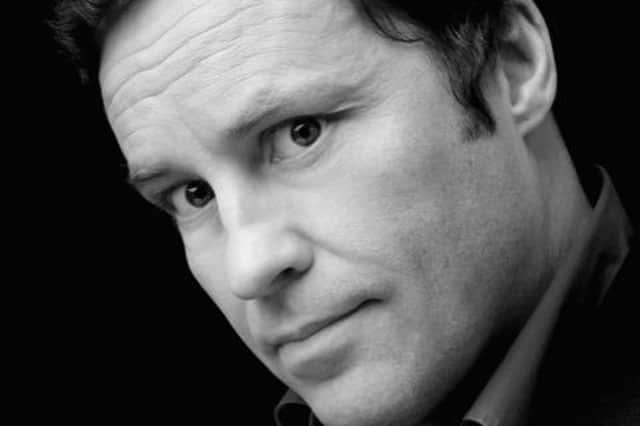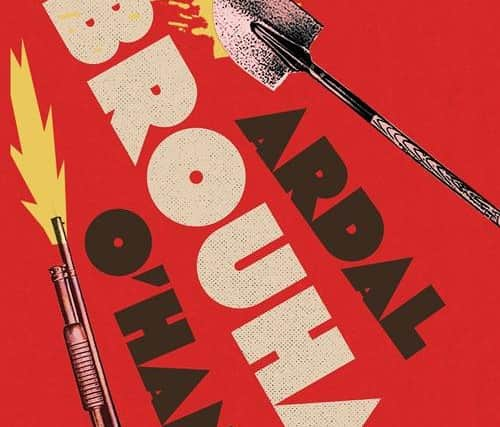Book review: Brouhaha, by Ardal O’Hanlon


As a schoolboy, I was taken on a trip to a local factory and I actually learned something. “What do we make here?” said the employee, and we dutifully chanted “printed circuit boards”. He said “No: we make profits”. It was a salutary, even minatory, revelation. Decades on and I still have to remind myself that publishing is a business and the business of business is money; not aesthetics, or enlightenment or the avant-garde. This is why there is the curious phenomenon of the “novel by a comedian”. No doubt at some meeting some enthusiastic person said “So-and-so off of what’s it called is recognisable and I bet they could write a novel!” Many have, and charity shops can attest to their success.
It is that kind of thinking that brought us works such as Stephen Fry’s Moab Is My Washpot and The Hippopotamus, which I read and cannot remember a single thing about. I read Ben Elton’s Stark which was like an inoculation, but tried Dead Famous as a kind of booster dose. I am no longer infected. The only novel by a comedian that I remember as being something other than a cash-in was Steve Martin’s The Pleasure Of My Company, a weird, surrealism-inflected novel about a man who has finally won the “Most Average American” competition. Of course, there are comic novels, it just seems as if they are rarely written by comedians. (Note to self: Eric Morecambe and Alexei Sayle both wrote novels, which I’d be intrigued to read).
Advertisement
Hide AdThe first thing to say about Ardal O’Hanlon’s Brouhaha is that is very good. By good I mean it is humane, clever, funny, gripping, complex, serious and surprising. It won’t win the Nobel or the Booker, but it ought to have a fair run at the Bollinger Wodehouse prize. It is comedy crime, which is a difficult genre to make work successfully. If the comedy is too overt, the harm to others is diminished. If the crime is too forward, the witticisms seem a little puerile. But O’Hanlon gets the balance perfectly right. I laughed out loud, and I sat and wondered about the horrible truths. That is no small achievement. The second thing to say is yes, it is Ardal O’Hanlon, who will always be Father Dougal from Father Ted to me. Give him his dues, there is one joke in the book very much in that style – about the Guess the Age of the Hen competition – that made me damn near lose my cup of tea.


It is a conventional set-up, handled unconventionally. There are three main characters, a classic sit-com structure. There are two deaths before the novel even begins. In the fictional town of Tullyanna, which reportedly bears more than a passing resemblance to O’Hanlon’s home town of Carrickmacross, Co Monaghan, Dove Connolly has blown his brains out, while Sandra Mohan went missing years beforehand. Dove’s friend Sharkey returns to the town he was run out of to attend the funeral. A journalist, Joanne McCallum, who had implicated Dove in the death of Sandra, has pricked up her ears about finally solving the crime. Then there is a former garda officer, Kevin, a grandfather, the victim of a non-fatal shooting and a man obsessed with what happened to Sandra as well. Each of the characters gradually reveals their complexities and – no pun intended – their troubles, as they tiptoe around a post Good Friday Agreement small town. There are suspects enough, from former terrorists turned respectable politicians to drug-raddled ne’er-do-wells. Tullyanna is “famed for its extra-wide Main Street. It was said to be the widest in Europe. A handy feature to have when there were so many people to avoid. Which was all very well except, in what was a smallish border town populated by just three thousand pinched faces and all of them secretive, you were never quite sure who exactly it was you were supposed to be avoiding”. But Dove has left a graphic novel – derivative it seems of Pat Mills Sláine – that with all its casual misogyny might have secret clues as to the crime.
One feature of the novel which is exceptionally good is that, as a crime thriller, it has to have a solution; but here there is a solution but no closure. The old hurts are still there. Each of the principal characters reaches an accommodation with the real world, and a kind of elegiac acceptance of it. There are various things – Sharkey’s collection of hair taken from his grandfather’s barber shop, references to St Dymphna, Baltic publicans – which might seem craic-like local colour, but end up being integral to the plotting. But it is profoundly serious: “the biggest lie was the oldest one, i.e. that the Cause is greater than the Organization and the Organization is greater than the Leadership… the original Cause was more or less forgotten in the mists of time”. Money, sadism, lust, grief and grudge outlive any political parties.
The “dark humour” is indeed dark, and it would be impossible to translate this into a novel with Anglican vicars and scone-tampering. It is funny, but it’s no joke. One character reflects that “he couldn’t say for sure himself whether he was pretending to be the Messiah, did think he was the Messiah, or was actually the Messiah. Ultimately, it amounted to a similar thing”.
By an odd chance, an advance copy of Frankie Boyle’s darkly humorous crime thriller popped through the letterbox this morning. I hope it is as good as O’Hanlon’s work.
Brouhaha, by Ardal O’Hanlon, Harper Collins, £16.99